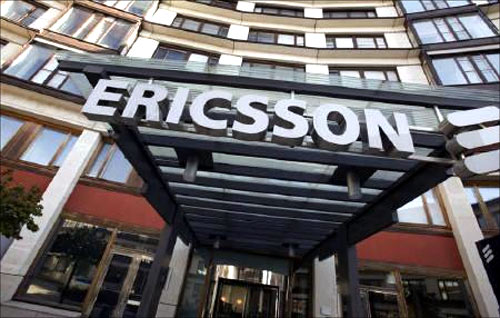
 Telecommunications company Ericsson (Ericsson Stock Quote, Chart, Mews, Analysts, Financials NASDAQ:ERIC) has performed well over the past 12 months and while investors may continue to be rewarded as telco companies benefit from the rollout of 5G networks globally, the telecom infrastructure sector is just too volatile, says Darren Sissons of Campbell Lee & Ross. Sissons points to names like Nortel and JDS Uniphase as prime examples of the sector’s boom and bust reality.
Telecommunications company Ericsson (Ericsson Stock Quote, Chart, Mews, Analysts, Financials NASDAQ:ERIC) has performed well over the past 12 months and while investors may continue to be rewarded as telco companies benefit from the rollout of 5G networks globally, the telecom infrastructure sector is just too volatile, says Darren Sissons of Campbell Lee & Ross. Sissons points to names like Nortel and JDS Uniphase as prime examples of the sector’s boom and bust reality.
“Optical equipment is the kind of business that happens — remember Nortel? — with a huge, huge spend and then you don’t see it for a long period of time. So, it’s what I would refer to as a high octane trade,” said Sissons, vice president and partner at Campbell Lee & Ross, speaking on BNN Bloomberg on Friday.
“When it runs, it runs huge. JDS Uniphase ran up from $3 to $1,000 a share and then ultimately got split at $4 a share — so, $3 or $4 a share with a peak of $1,000 a share,” he said. “So, when the sector runs it runs really, really hard and when it doesn’t it’s not a good place to be.”
“I do think [Ericsson] has some runway ahead of it and the fundamentals could be better if we have the opportunity, but it’s probably a sector where I think there are just too many risky political factors in play. And 5G is going to be more of an additional incremental revenue,” Sissons said. “So, for me, on a net basis it’s just a pass.”
Ericsson has been performing well in recent quarters after going through a multi-year restructuring where the company enacted cost-cutting measures, boosted R&D spend and replaced a number of positions at the executive level.
The results seem to have borne fruit, with Ericsson beating analysts’ estimates in its most recently reported financial period, the company’s Q1 posted in April. Adjusted earnings rose 15 per cent year-over-year to 5.3 billion Swedish crowns (US$627.9 million) for the quarter, with revenue even compared to a year earlier at 49.8 billion crowns. On average, analysts had been calling for earnings of 5.0 billion crowns and revenue of 53.42 billion.
Ericsson president and CEO Börje Ekholm said the company has gained market share in its Networks business, growing 15 per cent organically in that segment, while Digital Services had organic growth of three per cent.
“Our strategy, built on increased investments in R&D for technology and cost leadership, continued to bear fruit in the first quarter of 2021. We saw organic sales growth of ten per cent, primarily driven by market share gains in Networks. Adjusting for declining IPR revenues, organic sales growth was 14 per cent,” Ekholm said.
“Gross margin improved to 42.9 per cent year-over-year and margin increases in all segments more than offset lower IPR licensing revenues. Our EBIT margin increased to 10.7 per cent despite significant investments in our business and headwind from currency. We are well positioned to take advantage of the continued market momentum with a competitive 5G product portfolio and cost structure,” he said.
Part and parcel to the global 5G rollout, of course, has been the political debate over Chinese telecom giant Huawei, with the United States and a handful of similarly aligned countries issuing bans against the company’s participation in constructing 5G networks in their respective countries, citing concerns about close ties between Huawei and the ruling Chinese Communist Party which has made it law that Chinese companies comply with government requests to conduct intelligence work on its behalf.
So far, the Canadian government has yet to make a decision on a Huawei ban, but in the interim Canada’s telecom companies have on their own decided to go with other partners, with Ericsson being a prime source. Telus has said it will rely on Ericsson and Finland’s Nokia as its suppliers, while both Bell Canada and Rogers Communications have said Ericsson will be a 5G partner.
Sissons says the build out of telecommunications infrastructure in Europe has been beneficial to companies like Ericsson yet the future of the industry is not necessarily so bright as the hype around 5G might suggest.
“Up until the year 2000 timeframe, Europe was more advanced than Canada in terms of its grid network for telecommunications and then what happened was the European Union decided to lower the cost of consumer phones and as a consequence there was a lull, really an under-investment in the network in Europe,” Sissons said.
“That got recognized as a structural issue a few years ago and obviously the fibre build outs are starting to occur in Europe so there will be continuing development,” he said. “There are going to be towers and they’re going to be rolling out more wireless productivity and, obviously, you’ve got 5G around the world,” he said.
“The technology ban is starting to be applied to Huawei around the issues and political concerns whether or not they’re spying or spoofing are going to be headwinds for some of the Chinese operators. So, I do think there’s going to be some opportunity for some of the optical equipment companies,” Sissons said.
Leave a Reply
You must be logged in to post a comment.





 Share
Share Tweet
Tweet Share
Share




Comment